
Perhaps you’ve heard that you can’t copyright a groove. (Copyright isn’t really a verb, but everyone understands what you mean when you use it as one.) And on the heels of “you can’t” you might also hear, “But what about Blurred Lines?!” And yes, when the silly Blurred Lines case happened, it was said to “accomplish what no one has before.” Did it though? Did Blurred Lines change everything? No. The more time that passes, the more an aberration that verdict becomes. So to the extent that you can’t copyright a groove, which includes but is usually more than just rhythm, imagine how silly it would be if you could copyright just a rhythm. Then imagine the rhythm is simple and brief. It gets increasingly unfathomable.
But there’s a lawsuit right now, or really one that is a bit like forty lawsuits stacked together; one plaintiff suing a very long list of artists and labels for sounding like, well, reggaeton.
Indeed, Steely And Clevie may be reggaeton’s pioneers. Certainly, they’re on the shortlist. Here’s their “Fish Market,” the track most of this centers around.
Fine, let’s say they invented reggaeton. Someone had to. The lawsuit remains ridiculous.
Reggaeton, for better or worse, is fairly simple. I’m not its biggest fan. That’s fine, put that aside; long live reggaeton and all the joy it brings to people. But copyright naturally doesn’t protect simplicity nearly as readily as it does complexity. Copyright law wants to encourage creativity. It achieves this through a balance of protecting rights holders while allowing creators to create, say, something akin to a new original car design without reinventing the wheel. The wheel is a given; what you do with it is your original creation. Rhythms are wheels.
So as the basis of a massive consolidated lawsuit in which about forty defendants, including Justin Bieber, Pitbull, and Daddy Yankee, are being sued for infringing on it, “Fish Market” has the limiting problem that one cannot ever enjoy a monopoly on a riddim. In my opinion, it mustn’t be allowed. It matters not that every reggaeton beat sounds similar to the one in their “Fish Market,” or in “Dem Bow,” which we’ll get to shortly. What they are talking about is just a beat, a simple and repetitive one. It barely rises to be a “groove’ even if it has a bass component, little more than a note on one and three. It matters not that “Steely & Clevie” may have single-handedly ushered in a whole genre that now practically rules the world. The scale is irrelevant. Rhythms (riddims), by and large, cannot and should not be protected by copyright.
Simplicity isn’t bad, it’s just unoriginal. And more to the point, it’s not probative of copying. It’s certainly not that rhythm isn’t the most important thing in music, because it probably is.
Ask 100 musicians, good ones if you like, “What’s paramount, harmony or rhythm?” And my untested and unscientific opinion would be no fewer than 70 percent will say “rhythm.”
Thou. Shalt. Groove.
But rhythms on their own are not compositions, generally. Why “generally?” Only because nothing about music copyright should be binary, as long as music continues to be created. Possibilities are endless. It’s just intellectually more honest to keep an open mind. Same with chord progressions; “generally” not protectable by copyright, but it has to be subject to considerations about length and novelty. There comes a point, if perhaps an impractical one. So we leave room for the possibility that any element of music, taken to some degree, might deserve protection.
But practicality here is appropriate! Spurious lawsuits are bad. So here’s a rule of thumb:
If your rhythm can be mouse-clicked into an eight-measures-long sixteenth-note grid on any drum machine interface designed in the past thirty years, that rhythm, regardless of which spots on the grid you or the software’s randomizing feature check or don’t check, is probably not yours alone and you cannot claim a monopoly. Rhythms in general, and I dare say ANY rhythm that repeats every five seconds or so is a building block of music, public domain, and a foundation atop which your original and protectable creativity can be built.
BRIAN MCBREARTY – MUSICOLOGIZE
In the complaint, they notate the tracks that make up “Fish Market.” It doesn’t really matter what the forty defendants’ works sound like because the following is evidently what they are trying to claim to own, and it’s not protectable expression.
Two of the tracks are identical, and they’re the simplest thing there could be. The hi-hat and kick just play “four on the floor.”
And then they add a low boom that plays every other note.
Their tambourine does what tambourines do, play sixteenth notes.
Add a snare drum (I’ll show it to you with the metronome so you can hear the 1-2-3-4 of it.)
So that’s five parts, none remotely distinctive to any percussionist who ever picked up a stick. Put all that together, and you get this, a reggaeton track.
And then there’s “Fish Market’s” timbale part, four seconds long whereas everything else to this point was only two.
With the four-second timbale part, all together, it would sound something like this:
Over and over.
This lawsuit appears to be that ridiculous, times about forty.